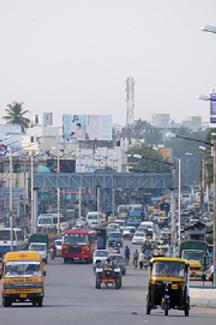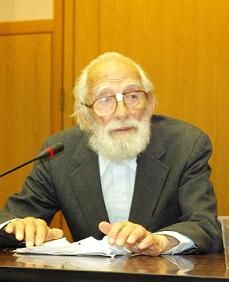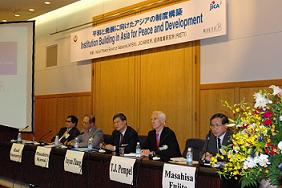Institution Building in Asia for Peace and Development
2009.09.08
On August 28-29, the International Conference on Institution Building in Asia for Peace and Development was held at JICA-RI. The event was a joint effort organized by JICA-RI, the Research Institute of Economy, Trade and Industry (RIETI) , and the Asian Peace Science Network (APSN). Among the participants were Walter Isard, Cornell University Professor Emeritus and founder of the Peace Science Society International, JICA-RI Director Keiichi Tsunekawa, RIETI President Masahisa Fujita, and other well-known researchers from overseas and Japan. The diverse crowd offered various political and economic viewpoints on regional institution-building in Asia and their practical experience to bring to the discussion table.
The aim of the event was for participants to discuss the design and development of regional institutions capable of promoting greater peace, security and prosperity throughout Asia against the backdrop of the current global economic crisis. The theoretical knowledge of scholars was combined with the experience of practitioners and policymakers, in presentations and active discussions.

Photo:Mika Tanimoto/JICA
The two-day conference started with an international symposium entitled "Institution Building in East Asia Beyond the Global Crisis" which was attended by members of diplomatic missions, government officers, academia, private sector affiliates, journalists, NGO and NPO members, and ODA agencies. RIETI President Fujita and Walter Isard both kicked-off the event with welcome speeches. JICA-RI Director Tsunekawa set the stage with his remarks and stressed JICA's dedication to human security and interest in Asian regional integration. Tsunekawa also highlighted the following three challenges to the regional integration of Asia:
Tsunekawa emphasized that the solutions to these problems will come not through an individual approach, but through a regional one.
These were followed by keynote lectures by Dr. Hadi Soesastro of the Center for Strategic and International Studies of Indonesia (CSIS), Dr. Masahiro Kawai of the Asian Development Bank Institute (ADBI), Dr. Yuyan Zhang of the Chinese Academy of Social Sciences (CASS), and Dr. T.J. Pempel of the University of California at Berkeley. Among the topics discussed were the role of APEC, the need for more effective economic institutions in Asia commensurate with the region's growing influence, the pros and cons of bilateral free trade agreements (FTAs), the advance of financial and monetary cooperation, the internationalization of the renminbi (RMB), challenges for Asia's regional security cooperation, and overall, the future prospects of Asia's regional institutions.
After the keynote lectures, a public panel discussion was held entitled "Institutional Cooperation in Asia beyond the Global Economic Crisis," moderated by Director Tsunekawa. Among the panelists was Naoki Umemiya, Assistant Director of the JICA Human Development Department Basic Education Group (First Division). Umemiya spoke about ASEAN University Network/Southeast Asia Engineering Education Development Network (AUN/SEED-Net). This project is intended to enhance the capacity of ASEAN to achieve further socio-economic development by implementing wide-ranged programs through collaborative research and the exchange of students and academic staff. Further exchange of students and staff for the enhancement of employability of graduates will eventually lead to raising the region's capacity to develop its own human capital.

Walter Isard, Cornell University Professor Emeritus
The second day followed the theme "Global Economic Crisis and Institution Building in East Asia for Peace and Development" and started with speeches by Isard, Fujita, and Tsunekawa. The rest of the day was comprised of six, closed workshops all based on a variation of the main theme. The sub-topics of the sessions were:
Naoshi Sato, JICA Senior Advisor, and Yasuyuki Sawada, JICA-RI Visiting Fellow, both presented in the "Development Cooperation for Institutional Capacity Development" session. Dr. Sawada spoke at length "On the Role of Technical Cooperation in International Technology Transfers. "Sawada and his team have created a model to quantify the effects of technological cooperation (TC) and other aid types on technology transfer and "catch-up" in 85 different developing countries for the study. His findings suggest that TC helps improve total factor productivity (TFP) and shortens the "catching-up" time. Because of this, he believes that TC may serve as an effective policy measure.
Naoshi Sato discussed "Institutional Capacity Development in JICA's Cooperation for ‘Rule of Law' Promotion." JICA's efforts in capacity development include support of the development of a country's rules and regulations as well as the capacity of its public organizations. Sato explained JICA's system for achieving this within long and short time frames, supported by two case studies of JICA's current efforts in Vietnam and Cambodia.
Jin Sato, also JICA-RI Visiting Fellow, spoke on "Government of Nature: Historical Roots and Contemporary Challenges" as part of the session on Institution Building for Environment and Resource Governance. Sato, analyzing the history of Thailand's state administrative systems development and the actual performance of forestry conservation, hypothesized that a reason for the country's sub-optimal performance in forest preservation might be found in the organizational structure and behavioral patterns of its bureaucratic system developed over the years.
Aside from the economic and political topics discussed, other topics touched upon were non-traditional security issues including the spread of disease across borders and crime-prone "borderland" areas within Southeast Asian states.
Overall, the two-day conference was a harmonious blend of opinion and insight from policy-makers, theorists, and practitioners. Though the speakers came from various backgrounds, one thing all members could agree upon was that the Asian region is in need of better, more efficient regional institutions. The details of how this should be done are the matter of future debate.

Panel discussants
■ Agenda&Paper
"Click on name to view presentation"
August 28
13:00 -13:05 Opening Introduction: Masahisa Fujita (RIETI)
13:05 -13:10 Welcome Speech:Keiichi Tsunekawa (JICA-RI)
13:10 -13:25 Welcome Speech:Walter Isard (Cornel Univ.)
13:25-15:50
Part 1: Keynote Lectures
Chair:
Masahisa Fujita (RIETI)
Keynote lecturers
Hadi Soesastro (CSIS).pdf
Masahiro Kawai (ADBI)
Yuyan Zhang(CASS)
T.J. Pempel (U.C. Berkeley)
Q & A
16:05-18:20
Part 2 Panel Discussion:
"Institutional Cooperation in Asia beyond the Global Economic Crisis"
Moderator:
Keiichi Tsunekawa (JICA-RI)
Panelists (in alphabetical order)
Min Gyo Koo (Yonsei Univ.)ppt .pdf
V. N. Rajasekharan Pillai (Indira Gandhi National Open Univ.)
John Ravenhill (Australian National Univ.).pdf
Naoki Umemiya (JICA).pdf
Susumu Yamakage (Univ. of Tokyo)
Discussion
Q & A
18:20-18:30 Closing Speech: Walter Isard
August 29
8:30 - 9:00 Reception
9:00 - 9:05 Opening Introduction: Keiichi Tsunekawa (JICA-RI)
9:05 - 9:10 Welcome Speech: Masahisa Fujita (RIETI)
9:10 - 9:40 Opening Presentation: Walter Isard (Cornell Univ.)
9:40-11:05
Panel 1: Institution Building for Trade and Investment
Chair:
Risaburo Nezu (RIETI)
Speaker 1 Shujiro Urata (RIETI / Waseda Univ.)
Speaker 2 Biswa N. Bhattacharyay (ADBI)
Discussant Yuyan Zhang (CASS)
Discussion
11:05-12:30
Panel 2: Institution Building for Finance, Currency and Macro-economic Policy
Chair:
Hadi Soesastro (CSIS)
Speaker 1 Eiji Ogawa (RIETI / Hitotsubashi Univ.)
Speaker 2 Chalongphob Sussangkarn (TDRI, ex-Minister of Finance)
Discussant Iwan Azis (Cornell Univ.)
Discussion
13:30-14:55
Panel 3: Development Cooperation for Institutional Capacity Development
Chair:
V.N.Rajasekharan Pillai (Indira Gandhi National Open Univ.)
Speaker 1 Naoshi Sato (JICA)
Speaker 2 Yasuyuki Sawada (Univ. of Tokyo, JICA-RI and RIETI)
Discussant Tatsuhiko Kawashima (Gakushuin Univ.)
Discussion
15:10-16:35
Panel 4: Institution Building for Environment and Resource Governance
Chair:
Glenn Palmer (Pennsylvania State Univ.)
Speaker 1 Jin Sato (Univ. of Tokyo and JICA-RI)
Speaker 2 Huijiong Wang (DRC of the State Council)
Discussant Jurgen Brauer (Augusta State Univ.)
Discussion
16:35-18:00
Panel 5: Security Issues (including non-traditional Security)
Chair:
Hiroshi Kato (JICA-RI)
Speaker 1 Patricio-Nunez Abinales (Center for Southeast Asian Studies, Kyoto Univ.)
Speaker 2 Takeshi Onimaru (National Graduate Institute for Policy Studies)
Discussant Manas Chatterji (Binghamton Univ. USA)
Discussion
18:05-18:50
Panel 6: Future Peace Science and APSN
Chair:
Iwan Azis (Cornell Univ.)
Speaker 1 Glenn Palmer (Pennsylvania State Univ.)
Speaker 2 Raul Caruso (University Cattolica del Sacro Cuore di Milano)
Speaker 3 Ling Xue(Peking Univ.)
18:50-19:00
Closing Session
Walter Isard (Cornell Univ.)

事業事前評価表(地球規模課題対応国際科学技術協力(SATREPS)).国際協力機構 地球環境部 . 防災第一チーム. 1.案件名.国 名: フィリピン共和国.

事業事前評価表(地球規模課題対応国際科学技術協力(SATREPS)).国際協力機構 地球環境部 . 防災第一チーム. 1.案件名.国 名: フィリピン共和国.

事業事前評価表(地球規模課題対応国際科学技術協力(SATREPS)).国際協力機構 地球環境部 . 防災第一チーム. 1.案件名.国 名: フィリピン共和国.

事業事前評価表(地球規模課題対応国際科学技術協力(SATREPS)).国際協力機構 地球環境部 . 防災第一チーム. 1.案件名.国 名: フィリピン共和国.

事業事前評価表(地球規模課題対応国際科学技術協力(SATREPS)).国際協力機構 地球環境部 . 防災第一チーム. 1.案件名.国 名: フィリピン共和国.
scroll